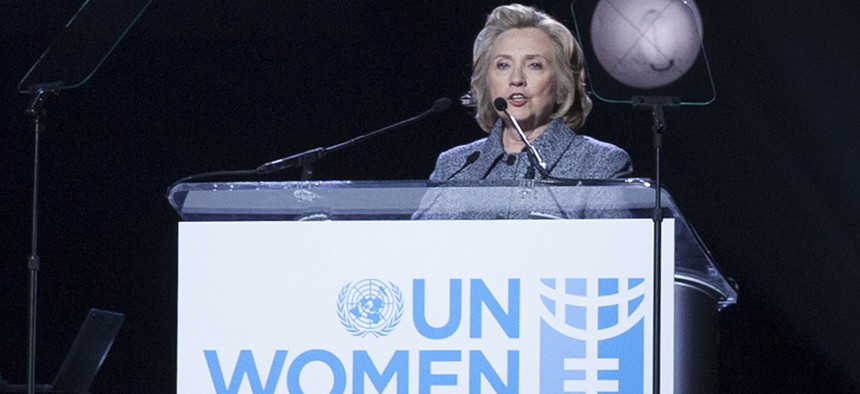
Clinton speaks at the UN at a conference early in March. lev radin / Shutterstock.com
Clinton's Rough Road Ahead
The liberal base and the media will work together to make sure she isn't crowned as the Democratic nominee.
The front-page headline in The Washington Post said it all: "Democrats in key states ask: Where is Hillary?" Putting aside the simple facts that the Iowa caucus and New Hampshire primary are both 10 months away and that Hillary Clinton is not expected to officially enter the race before next month, this headline says so much more. In fact, it telegraphs the coming story line.
For party activists in early states—particularly Iowa and New Hampshire, where there is an enormous sense of entitlement, much more so than in Nevada and South Carolina—a presidential contender can't come soon or often enough to satisfy their cravings for attention. This is their chance every four years to bask in the sun of national attention, and they don't want to miss one minute of it. Everyone wants his or her picture taken with someone who could be the next president of the United States or, better yet, give advice to that would-be commander in chief about what really needs to be done.
Then there are the overcaffeinated journalists, who desperately need stories—preferably ones accompanied by conflict and controversy, even when campaigns are in the embryonic stages—focusing on organizing and fundraising, two of the more mundane aspects of modern campaigns. Even the tiniest signs of bickering and infighting, real or not, are worth examining and often exaggerating. Reporters and producers need to get a story on the front page or on the nightly news, the oxygen they breathe.
Finally, there is the demand for pandering from those in the ideological bases of the party, on the right for Republicans, on the left for Democrats. Candidates are required to turn themselves inside out (unless they started there to begin with) during the primaries, then attempt to straighten themselves out for the general election, usually with varying degrees of success. While Clinton certainly seems more liberal than her husband was during his campaigns and presidency, the Democratic Party is considerably more liberal now than it was then. A fairly substantial and highly vocal part of the party would like a nominee who is more liberal than President Obama turned out to be. They see Obama's compromises on the Dodd-Frank financial-reform law and his support for NSA eavesdropping, drone strikes, and the troop surge in Afghanistan as just the beginning of a litany of sellouts of the Left.
How does all of this come together? Polls show Hillary Clinton to be a prohibitive favorite for the Democratic nomination; an NBC News/Wall Street Journal poll conducted earlier this month showed that 86 percent of Democratic primary voters could see themselves supporting her candidacy. But there are also forces of human nature that will try to chip away at that seeming inevitability. Those Democrats in early states, believing it was ordained in the Ten Commandments, the Magna Carta, and the Constitution that they be the screening committee for the nation, may well bridle at the suggestion that anyone's nomination is a fait accompli, at least before their state has weighed in. Neither party's activists see themselves as rubber stamps. Indeed, New Hampshire's voters have been known to side with a candidate other than the Iowa winner, just to make sure their 10 cents is counted; 2008 was a classic example.
Journalists looking for a good story, whether it truly exists or not, will endeavor to find a challenger and create a David and Goliath narrative, even if it means building David up to the point when he could be a realistic threat to the front-running Goliath. If there are multiple candidates auditioning for the David role, the media will size up each contender and then hype the one that seems most plausible as the real threat to Clinton.
Finally, the ideologues, the true believers, those who endeavor to spurn the good for the perfect, will promote one or more alternatives to put pressure on Clinton to move to the left at the time she is trying to maintain her general-election viability while steering toward a center-left course. Someone will emerge to coalesce disenfranchised ideologues, hoping to reach a critical mass that will attract journalists' attention.
While Clinton will kick off her campaign with very impressive numbers among fellow Democrats, there are very natural and predictable forces that will make what should be an easy route a much more challenging road than it now appears. For Clinton to waltz uneventfully through to the nomination would defy forces of human nature. Don't count on that happening
(Image via lev radin / Shutterstock.com)






